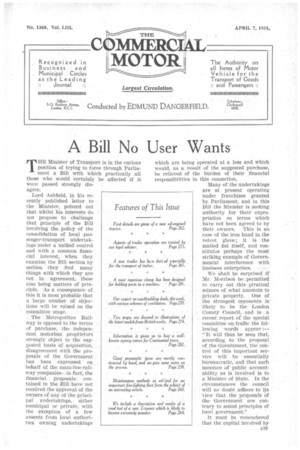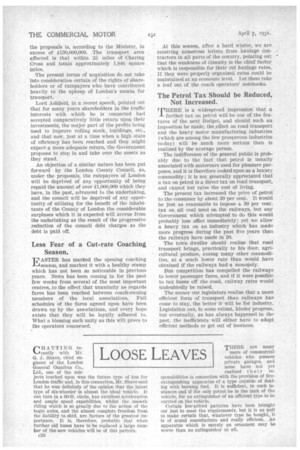A Bill No User Wants•
Page 57

Page 58

If you've noticed an error in this article please click here to report it so we can fix it.
THE Minister of Transport is in the curious position of trying to force through Parliament a.Bill with Which practically all those who. would Certainly be affected if it were passed strongly dis agree.
Lord Ashfield, in his recently published letter _ to the Minister, pointed out that whilst his interests do not propose to challenge that principle of the. Bill involving the Policy of the consolidation of local pasienger-transpott . undertakings under a Unified control and with. a common financial interest, When they examine the Bill section by seCtion: :they -.find. many things with 'which they are fait . in d.agreeilie.nt, . these also being matters of principle.--As a consequence of_. • this it is most probable. that a large: nu/fiber : Of: objections .will' be raised on the committee. stage.
: _The : Metropolitan Rail: way is opposed-to the terms • -. of purchase, the independent motorbus proPiletors strongly object to the suggested basis of acquisition, disagreement with the pro, posals of the Government has been expressed ' on behalf of the main-line railway 'companies—in fact, the financialproposals ; containedin 'the-Bill have not • received the approval of the owners of any df the Princi. pal undertakings, either municipal or private, with the exception of 'a few assents from local authorities owning undertakings which are being operated At a loss and which would, as a. result of the suggested purchase, be relieved of the burden of their financial' responsibilities in this connection. .
Many of the undertakings are, at present operating under franchises granted, by Parliament, and in this Bill the Minister is seeking authority for their expropriation on terms which have not been agreed to by their owners. This is no case of the iron hand in the velvet glove ; it is the mailed fist itself, and constituts perhaps the most strikingexample of Governmental interference with business enterprises.
We shall be surprised :if Mr. Morrison be r,..permitted to carry. out this :piratical seizure of :what amonnts. to private. pronerty. 7 Oneof the strongest: opponents .15 likely to be -.the London Cotinty'. Couneil,•• . and : in • -7a recent. report ; of, the special cominittee •-ontraffic: the following words appear "It' Will thus. be seen that according to the proposal of the Government,' the. control of this important Service Will'essentially bureaucratic, and that such measure of public accountability as is involved is to a Minister of1Stp.te. In the circumstances, the . council Will no doubt 'Adhere to' its view. that the 'proposals of the Government are contrary to sound principles of local government."
It must be remembered that the capital involved by the proposals is, according to the Minister, in excess of £130,000,000. The transport area affected is that within 25 miles of Charing Cross and totals approximately l,S46 square miles.
The present terms of acquisition do not take into consideration certain of the rights of shareholders or of ratepayers who have contributed heavily to the upkeep of London's means for transport.
Lord Ashfield, in a recent speech, pointed out that for many years shareholders in the traffic interests with which he is connected had accepted comparatively little return upon their investments, the major part of the profits being used to improve rolling stock, buildings, etc., and that now, just at a time when a high state of efficiency has been reached and they might expect a more adequate return, the Government proposes to step in and take over the assets as they stand. • An objection of a similar nature has been put forward by the London County Council, as, under the proposals, the ratepayers of London will be deprived of any opportunity of being repaid the amount of over £1,000,000 which they have, in the past, advanced to the undertaking, and the council will be deprived of any opportunity of utilizing for the benefit of the inhabitants of the County of London the considerable surpluses which it is expected will accrue from the undertaking as the result of the progressive _reduction of the council debt charges as the debt is paid off.
Less Fear of a Cut-rate Coaching Season.
EASTER has marked the opening coaching season, and marked it with a healthy stamp which has not been so noticeable in previous years. News has been coming in for the past few weeks from several of the most important centres, to the effect that unanimity as regards fares has been reached between coach-owning members of the local associations. Full schedules of the fares agreed upon have been drawn up by the associations, and every hope exists that they will be loyally adhered to. What a blessing such unity as this will prove to the operators concerned. At this season, after a hard winter, we are receiving numerous letters from haulage contractors in all parts of the country, -pointing out that the weakness of disunity is the chief factor which is responsible for their cut haulage rates. If they were properly organized rates could be maintained at an economic level. Let them take a leaf out of the coach operators' notebooks.
The Petrol Tax Should be Reduced, Not Increased.
:r HERE. is a widespread impression that a -Ifurther tax on petrol will be one of the features of the next Budget, and should such an imposition be made, the effect on road transport and the heavy motor manufacturing industries (which are among the few prosperous industries to-day) will be much more serious than is realized by the average person.
The indifference of the general public is probably due to the fact that petrol is usually associated with motorcars used for pleasure purposes, and it is therefore looked upon as a luxury commodity ; it is not generally appreciated that a tax on petrol is a direct tax on road transport, and cannot but raise the cost of living.
The present tax increased the price of _petrol to the consumer by about 30 per cent. It would be just as reasonable to impose a 30 per cent. tax on all coal used on the railways, but any Government which attempted to do this would probably lose office immediately ; yet we allow a heavy tax on an industry which has .made more progress during the past five years than the railways hare made in 20. The town dweller should realize that road transport brings, practically to his door, agricultural produce, among many other commodities, at a much lower rate than would have obtained if the railways had a monopoly.
Bus competition has compelled the railways to lower passenger fares, and if it were possible to tax buses off the road, railway rates would undoubtedly be raised.
The sooner our legislators realize that a more efficient form of transport than railways has come to stay, the better it will be for industry. Legislation can, to some extent, hinder progress, but eventually; as has always happened in the past, the inefficients will either have to adopt efficient methods or get out of business.




























































































































